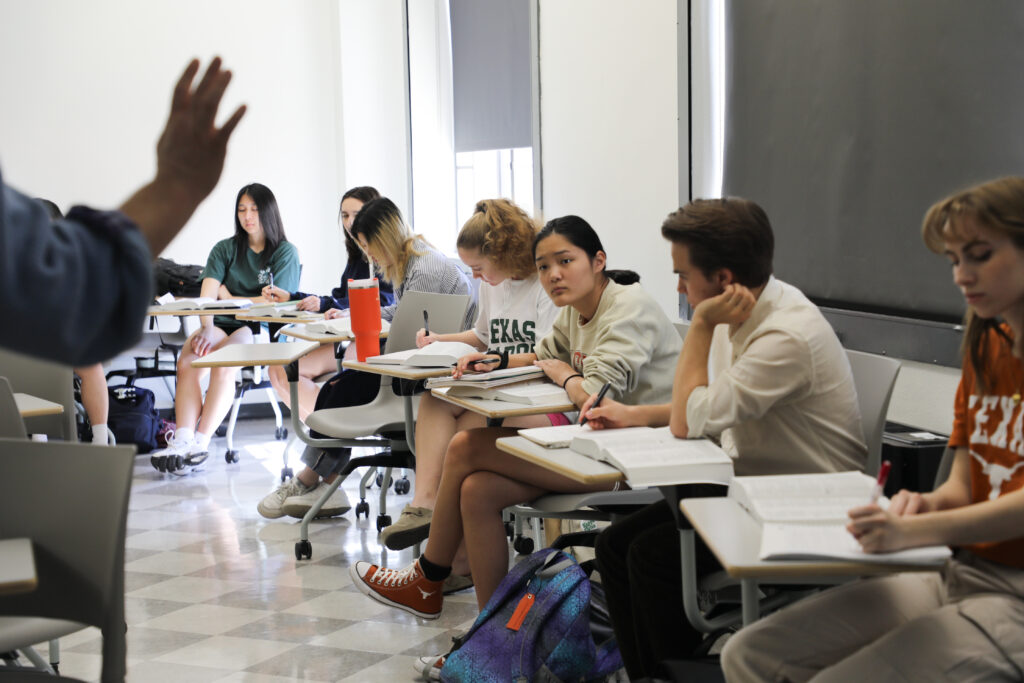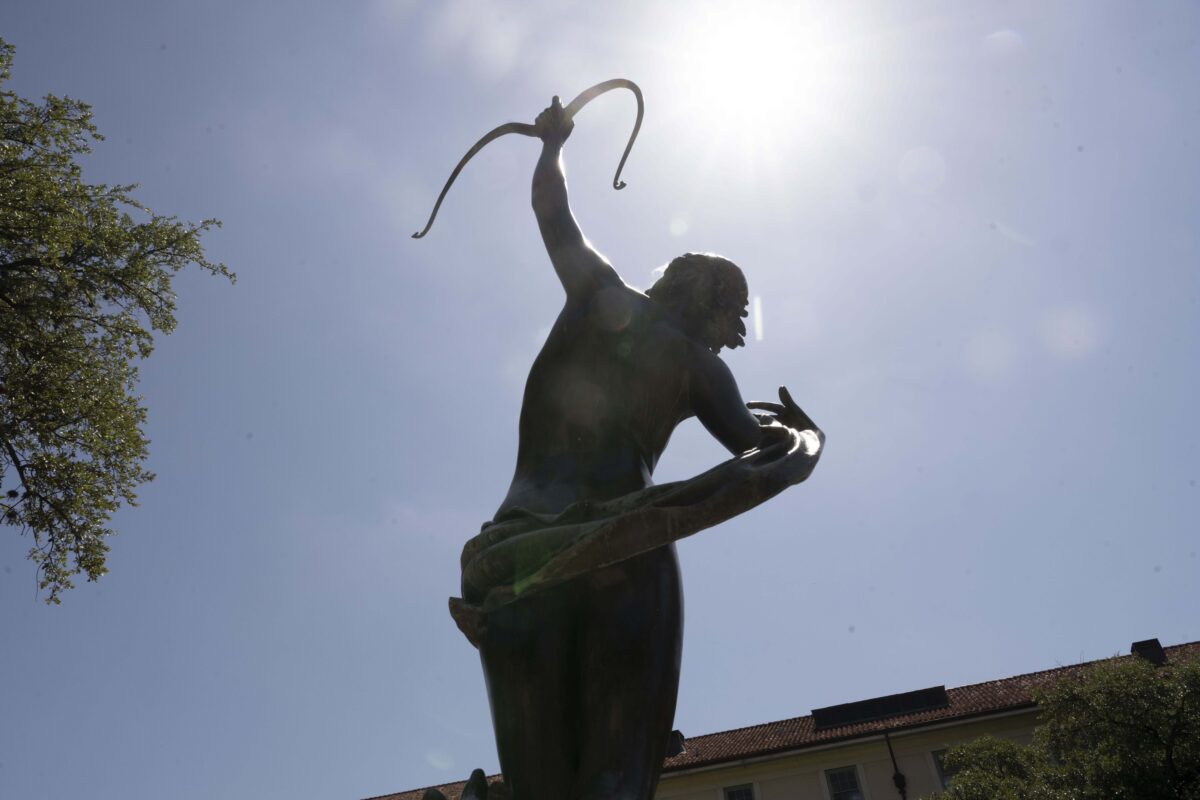The Jefferson Center for Core Texts and Ideas was born, in 2006, in a political context very similar to the one that has recently produced the University of Austin, the Civitas Institute at UT Austin, and UT’s School of Civic Leadership. There was a conservative critique of the university, both of the predominantly left-liberal politics of its faculty and of the fractured and specialized nature of its curriculum. And there was a push, from conservative donors outside the university as well as traditional-minded faculty within, to develop an alternative.
The program in Western Civilization and American Institutions (WCAI), as the Jefferson Center was originally known, was that alternative. It wasn’t dedicated to teaching or cultivating conservatism. The faculty who ran it were sincere in their non-political commitment to the great books tradition, and the affiliated faculty who taught in the program were politically heterodox. The flavor of the community, however, and the outside funding that helped bring it into existence, were undeniably conservative.
In 2009, after a few years of simmering conflict between the program and detractors at the university, its original leadership was pushed out, and it was rebranded as the (more politically neutral sounding) Jefferson Center for Core Texts and Ideas. Thomas Pangle, a professor of government and affiliate of the program, took over as director. He was subsequently joined as co-director by his wife and fellow government professor Lorraine Pangle. Both Pangles were politically conservative, but neither was (or is) a culture warrior.
What has evolved since, under the nearly 15-year stewardship of the Pangles, is a community that remains friendly to conservatism but is not guided by it. The culture war edges have been sanded off. Left unadulterated, however, is the passionate commitment to the study of the great books, the cultivation of the life of the mind, and the view of education as a matter of the highest stakes.

“These texts and ideas matter not just because they created the world in which we live,” said Lorraine Pangle. “They matter because they can and should be an initiation into a life of purpose and meaning. Whatever our students go out into the world to do after they leave the Forty Acres, our goal is to equip them to do it with the utmost seriousness and thoughtfulness.”
At the Center’s core are two related initiatives: the Certificate Program in Core Texts and Ideas (CTI) and the Jefferson Scholars Program. The CTI certificate is a six-course sequence in philosophy, literature, science, and the arts that is open to all undergraduates at The University of Texas at Austin and is designed to help them meet general curricular requirements through the close study of essential texts and ideas that have shaped our world.
Students in the Jefferson Scholar Program take the same six-course CTI sequence, but their in-class time is enriched by a host of supplementary activities, including coffee hours, book clubs, self-organized reading groups, and organized outings to plays, classical music concerts, jazz clubs, and museums. In their first year, Jefferson Scholars can elect to live together in a “living and learning community” in one of the dorms. After their first year, students can advise new freshmen and organize activities as peer mentors.
“We want students to live through these books, and you can only do that if you’re thinking about them in a really personal way and in connection with other people,” said Erik Dempsey, assistant director of the Jefferson Center and an associate professor of instruction with the Center.
—
When Gabriel Babineaux first heard about the Jefferson Scholar Programs, as a senior in high school who’d just been admitted to UT Austin, it solved a problem he didn’t quite realize he’d had. He was fascinated by the big questions about the meaning of life, but he didn’t have a clear sense of what kind of major was best suited to his interests, which spanned philosophy and politics and literature. He also didn’t know what he wanted to do after college.
“I thought maybe I’d go into law, or party politics, and so I should maybe major in government. When I saw the application for the Jefferson Scholars Program, it seemed to me like this was the very picture of what I was looking for,” said Babineaux.
Babineaux chose to major in government and also to apply to the highly selective Jefferson Scholars Program. He was accepted, and JSP, as the students call it, has changed the course of his education and through it his life, which he now intends to orient around the academic study and teaching of big ideas.
“When I said I was interested in ’government,’” says Babineaux, “I now realize that what I meant was I wanted to study political philosophy, political literature.”
Most Jefferson Scholars don’t go on to become academics. They’re more likely to go into business or become doctors. What they share with each other, however, is a conviction that asking the big questions, and talking seriously and at length to others about them, is at the core of what it means not just to get a good education but to live the good life.
“Taking a JSP class just feels different,” says Babineaux. “That’s not to denigrate my other classes, which are great, but when you take a class in JSP, there’s a seriousness to it. It’s not just about the class. They demand things from you because they think what they’re doing has serious consequences.”
The Jefferson Center’s six-course core curriculum requires students to take one class each in four areas — Philosophy and Literature of the Ancient World, Major Texts of World Religion, History of Political Philosophy, and America’s Constitutional Principles — along with two elective courses chosen from great books courses in a broader range of disciplines. The point is to give students some discretion and a great deal of guidance in what they study, allowing them a flexibility of approach but requiring a shared grounding in essential texts and ideas.
A key goal, says co-director Tom Pangle, is equipping students to participate in the series of ongoing and overlapping conversations about good books and hard questions that constitute the beating heart of the Jefferson Center community. “Especially in our contentious, ideologically riven society, a crucial part of our work is helping students do this well both inside and outside of the classroom and over the course of years, even a lifetime,” says Pangle. “We are inviting them into a conversation that relies on shared reference points, shared conceptual concerns, and common vocabulary. It is a conversation, as well, that connects us to others across the world, to our ancestors going back a few thousand years, and to our own future descendants.”
As part of their participation in the core curriculum, all JSP and CTI students are required to take CTI 302, Classics of Social and Political Thought, in which they typically read Aristotle’s Nicomachean Ethics or Politics; Augustine’s City of God or Thomas Aquinas’ political writings; at least one foundational text of modern liberalism (e.g. Locke’s Second Treatise of Government); and at least one modern critic of the Enlightenment (e.g. Nietszche). Other authors frequently studied include Plato, Machiavelli, Hobbes, Spinoza, Montesquieu, Rousseau, Kant, Hegel, Marx, and Mill.
In the other core areas, where they have a bit of (but not too much!) choice in which course to take, students are likely to read Plato, Thucydides, Homer, and one or more of the great ancient Greek playwrights; selections from the Hebrew, Muslim and Christian sacred texts and their major interpreters; the Declaration of Independence, Federalist Papers, Tocqueville’s Democracy in America, and African American authors such as Martin Luther King, Jr.
“Young Americans are coming of age in a time of extraordinary freedom, and they have an enormous responsibility to maintain freedom in an unpredictable world,” says Lorraine Pangle. “As future leaders and citizens, we want them to understand well the principles of free government and to acquire the practical wisdom to meet challenges that we may not even foresee. But we also want them to think deeply about questions of concern to all of us as individuals, like what happiness is, and to develop a taste for the happiness that comes of reading good books together with friends.”
